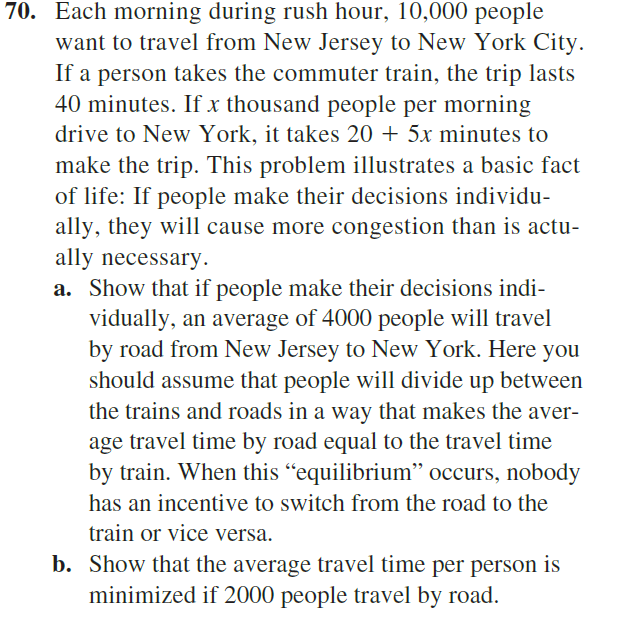Each morning during rush hour, 10,000 people want to travel from New Jersey to New York City. If a person takes the commuter train, the trip lasts 40 minutes. If x thousand people per morning drive to New York, it takes 20 + 5x minutes to make the trip. This problem illustrates a basic fact of life: If people make their decisions individu- ally, they will cause more congestion than is actu- ally necessary. a. Show that if people make their decisions indi- vidually, an average of 4000 people will travel by road from New Jersey to New York. Here you should assume that people will divide up between the trains and roads in a way that makes the aver- age travel time by road equal to the travel time by train. When this “equilibrium" occurs, nobody has an incentive to switch from the road to the train or vice versa. b. Show that the average travel time per person is minimized if 2000 people travel by road.
Each morning during rush hour, 10,000 people want to travel from New Jersey to New York City. If a person takes the commuter train, the trip lasts 40 minutes. If x thousand people per morning drive to New York, it takes 20 + 5x minutes to make the trip. This problem illustrates a basic fact of life: If people make their decisions individu- ally, they will cause more congestion than is actu- ally necessary. a. Show that if people make their decisions indi- vidually, an average of 4000 people will travel by road from New Jersey to New York. Here you should assume that people will divide up between the trains and roads in a way that makes the aver- age travel time by road equal to the travel time by train. When this “equilibrium" occurs, nobody has an incentive to switch from the road to the train or vice versa. b. Show that the average travel time per person is minimized if 2000 people travel by road.
Practical Management Science
6th Edition
ISBN:9781337406659
Author:WINSTON, Wayne L.
Publisher:WINSTON, Wayne L.
Chapter8: Evolutionary Solver: An Alternative Optimization Procedure
Section8.3: Introduction To Evolutionary Solver
Problem 2P
Related questions
Question
What's a good approach to this question using Excel? It's on Opimization. Thank you.

Transcribed Image Text:70. Each morning during rush hour, 10,000 people
want to travel from New Jersey to New York City.
If a person takes the commuter train, the trip lasts
40 minutes. If x thousand people per morning
drive to New York, it takes 20 + 5x minutes to
make the trip. This problem illustrates a basic fact
of life: If people make their decisions individu-
ally, they will cause more congestion than is actu-
ally necessary.
a. Show that if people make their decisions indi-
vidually, an average of 4000 people will travel
by road from New Jersey to New York. Here you
should assume that people will divide up between
the trains and roads in a way that makes the aver-
age travel time by road equal to the travel time
by train. When this "equilibrium" occurs, nobody
has an incentive to switch from the road to the
train or vice versa.
b. Show that the average travel time per person is
minimized if 2000 people travel by road.
Expert Solution
This question has been solved!
Explore an expertly crafted, step-by-step solution for a thorough understanding of key concepts.
This is a popular solution!
Trending now
This is a popular solution!
Step by step
Solved in 5 steps with 4 images

Knowledge Booster
Learn more about
Need a deep-dive on the concept behind this application? Look no further. Learn more about this topic, operations-management and related others by exploring similar questions and additional content below.Recommended textbooks for you

Practical Management Science
Operations Management
ISBN:
9781337406659
Author:
WINSTON, Wayne L.
Publisher:
Cengage,

Practical Management Science
Operations Management
ISBN:
9781337406659
Author:
WINSTON, Wayne L.
Publisher:
Cengage,